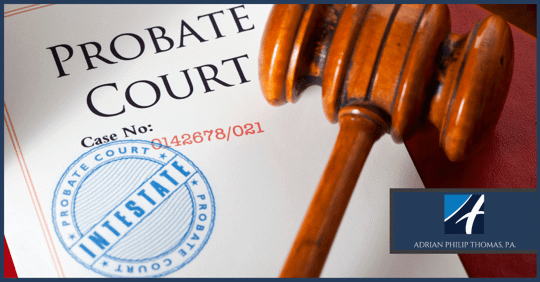What is probate?
Probate is a formal legal process that recognizes a will and the personal representative of a deceased person. The probate process includes gathering the decedent’s assets and distributing them to the intended beneficiaries. The state of Florida establishes two types of probate administration:
Formal administration
Summary administration
In this process, the decedent’s assets will pay for the probate proceeding’s cost, their funeral expenses, and any outstanding debts. If there is a remainder of assets, they will be distributed among the decedent’s beneficiaries.
What are assets in probate?
Probate assets are assets under the decedent which do not have provisions for automatic succession of ownership after death. These assets have no beneficiary designation and can be passed down according to the deceased’s Will. Probate assets include:
Property
Money
Vehicles
Stocks and Bonds
On the other hand, there are non-probate assets that are not controlled by the probate process and are passed on to the beneficiary. For example, if a bank account lists a beneficiary, the assets will go directly to them without having to go through the probate process. Non-probate assets include:
Life insurance policies
401(k)s, IRAs, and annutities
Assets put into a properly funded trust
Any assets held as joint tenants with rights of survivorship (JTWROS)
Is probate necessary?
Probate is necessary to complete any affairs the decedent leaves behind. However, some assets do not require probate preceding in order to transfer ownership. If you are unsure if you need to go through probate, contact our office for a consultation.
What if there is no Will?
When a person dies without a Will, their property is temporarily controlled by the Florida Intestacy Statues, and it needs to be probated. In this situation, the decedent’s probate assets can be passed down in a multitude of ways. Usually, the surviving spouse receives the decedent’s probate estate. If not, it can be passed on to the descendants, parents of the decedent, or siblings. Probating property can be a complex situation for families, and it’s highly recommended to create a Will to designate a personal representative to handle your assets.
How long is the probate process?
The probate process can take anywhere between three months to two years, depending on the complexity of the estate. If the estate does not have to file a federal estate tax return, the documents needed to close the probate estate are due within the 12 months of the issuance of letters of administration. If the estate does not require the filing of an estate tax return without litigation involved, the case can close anywhere between five to six months.
If the estate is required to file a federal estate tax return, the papers to close the probate administration will be due within 12 months from the date the tax return is due. This date can be flexible as sometimes the IRS’ acceptance of the estate tax return cannot be completed within that period.
Do I need a lawyer for probate?
Yes, you will need a probate lawyer to deal with the intricacies of settling an estate. In the state of Florida, a probate lawyer is required as documents need to meet certain specifications and wordings that only legal professionals can take care of. In cases of ‘disposition without administration”, “summary administration”, or any case where the executor is the sole beneficiary, a lawyer is not required. However, as said before, it’s best to have legal counsel for these complex cases.
How we can help
The team here at Adrian Philip Thomas, P.A. has been serving the state of Florida with guidance since 2002. Probate can be a long and complex process, but our seasoned attorneys are here to help you get through this tough time. If you are going through the probate process and have concerns about your case, do not hesitate to reach out.
Visit our website or call (954) 764-7273 to schedule a free consultation today.

